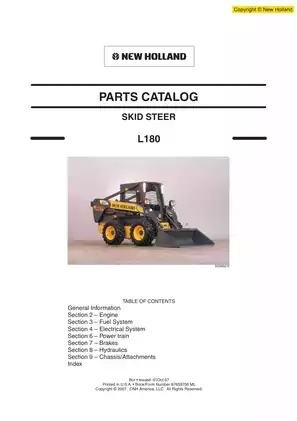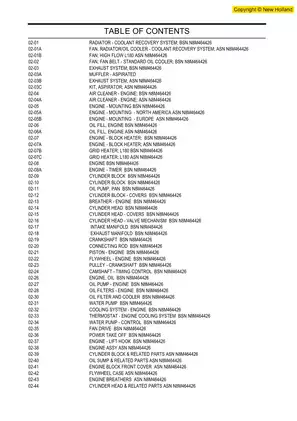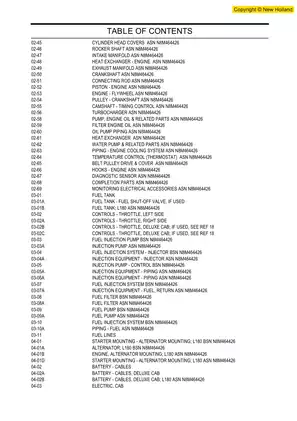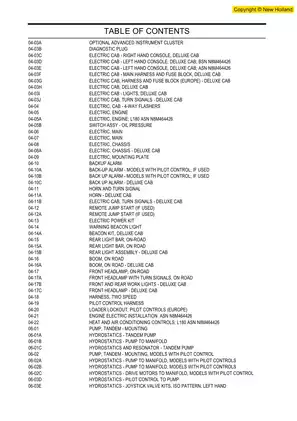New Holland L180 Skid Steer Parts Catalog
New Holland L180 troubleshooting and repair reference including relevant parts diagrams for various engine and chassis components. Part numbers and descriptions provided for accurate identification. PN 87659706 ML
Manual Preview

Sample pages from the New Holland L180 Skid Steer Parts Catalog manual





Purchase & Download
Models Covered & Key Technical Specifications
New Holland L180 (2007+) Official Parts Catalog: New Holland L180 (2007+) Reference-Archive | Series Compendium.
- Technical Specifications Data: 1.4 Liters provides the engine displacement capacity.
- Part Identification Category: All engine components are cataloged for easy part lookup.
- Component Listing Data: Over 1000 part numbers are listed within this manual.
- System Coverage Data: The entire cooling system is documented for maintenance needs.
- Design Configuration Data: Components are listed with their corresponding part numbers.
- Operational Range Data: Specific part applicability is detailed by serial number.
Professional Workshop Service Manual & Technical Specifications
OEM-Grade Factory Training Manual: New Holland L180 (2007+) Parts Catalog
Serial-Range: L180 // Repair-Classification: Engine Components / Cooling System Logic // Serial-Range: Engine / Cooling System.
| Integrated-Framework | Baseline | Context |
|---|---|---|
| Engine Mounting | Bolt, Hex, M6 x 20, 8.8 | Connects the engine to the frame securely |
| Cooling System | Washer, Spring, Belleville, M8 | Secures the fan shroud components |
| Fan Drive | Screw, Hex, M10 x 25, 8.8 | Fastens the fan pulley mechanism |
| Engine Oil Pump | Gasket | Provides a seal for the oil pump assembly |
| Oil Filter | O-Ring | Ensures a tight seal for the oil filter housing |
| Fan Blade | Nut, 5/16"-18, G5 | Secures the fan blade to the hub |
Integrated service sections encompass:
- Engine Components (Section 2)
- Cooling System (Section 02-32)
- Fan Drive (Section 02-35)
- Oil Pump (Section 02-11)
- Oil Filter (Section 02-28)
- Engine Assy (Section 02-38)
This New Holland L180 Parts Catalog documents the various components of the skid steer loader. It provides detailed illustrations and part numbers for each component, facilitating maintenance and repair procedures. Information regarding engine, cooling system, and various mechanical assemblies is thoroughly covered. Technically requiring accurate part identification for the strategic operation of your machine, this manual ensures the correct parts are sourced for optimal performance. The catalog includes detailed sections on engine components, cooling systems, and related parts for comprehensive coverage.
FAQ
Customer Reviews
Read what our customers say about this New Holland Skid Steer Loader manual and share your own experience.
Add a Review
This policy contains information about your privacy. By posting, you are declaring that you understand this policy:
- Your name, rating, website address, town, country, state and comment will be publicly displayed if entered.
- Aside from the data entered into these form fields, other stored data about your comment will include:
- Your IP address (not displayed)
- The time/date of your submission (displayed)
- Your email address will not be shared. It is collected for only two reasons:
- Administrative purposes, should a need to contact you arise.
- To inform you of new comments, should you subscribe to receive notifications.
- A cookie may be set on your computer. This is used to remember your inputs. It will expire by itself.
This policy is subject to change at any time and without notice.
These terms and conditions contain rules about posting comments. By submitting a comment, you are declaring that you agree with these rules:
- Although the administrator will attempt to moderate comments, it is impossible for every comment to have been moderated at any given time.
- You acknowledge that all comments express the views and opinions of the original author and not those of the administrator.
- You agree not to post any material which is knowingly false, obscene, hateful, threatening, harassing or invasive of a person's privacy.
- The administrator has the right to edit, move or remove any comment for any reason and without notice.
Failure to comply with these rules may result in being banned from submitting further comments.
These terms and conditions are subject to change at any time and without notice.
Reviews (3)